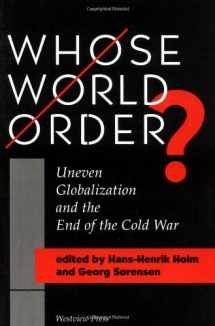
Whose World Order?: Uneven Globalization And The End Of The Cold War
Book details
Summary
Description
The putative new world order, when viewed from different regions of the globe, is not really new, is hardly global in scope, and is anything but orderly in its development. In this volume, an international cast of contributors comes together to share regional perspectives on questions about peace and security, economic growth and welfare, and democracy and civil society in the postCold War world. They find that there has been uneven globalization” with strong regional variation”two important concepts that this book brings to theory-building beyond the rhetoric of new world order thinking. An ideal supplement for many courses in international relations, Whose World Order? transcends the typically Eurocentric view projected in most textbooks, combining theory and practical evidence from the different regions in innovative applications and analyses.


We would LOVE it if you could help us and other readers by reviewing the book
Book review



